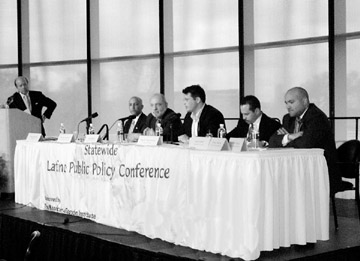The 2004 Statewide Latino Public Policy Conference, titled “Advancing the Latino Agenda: Perspectives from Policymakers and the Community,” was held on Friday, April 23 at the JFK Library and the UMass Boston Campus Center. The daylong event, sponsored by the Mauricio Gastón Institute for Latino Community Development and Public Policy, brought members of the Latino community, advocates of the Latino agenda and Latino policymakers together to discuss the progress made over the last year in different Latino communities regarding a variety of public policy issues.
The mission of the conference was to analyze the present condition of Massachusetts Latinos and discuss future prospects, with a focus on externalizing the discussion beyond the conference and into the community. There were discussions and workshops, and the crowd of political figures, activists, community leaders, academics and students seemed enthusiastic about turning this dialogue into action after the conference.
The conference started out with a speech by keynote speaker Edward M. Kennedy, senior senator from Massachusetts. He recognized the important presence of Latinos in the state legislature and city councils in Massachusetts. He also criticized the White House for their lack of involvement in pressing Latino political needs.
“The White House should know that it is going to take more than Mariachis playing in the West Wing to win your vote,” said Kennedy. “They should know that a photo-op with Dominican baseball players is no substitute for addressing the needs of our nation’s Latino families.”
Kennedy focused on several pressing issues that Latinos face in the U.S., including education reform. He referred to a bill that he supported two years ago, along with President Bush, the No Child Left Behind Act. He suggested, however, that it had become a “flagrant” example of a federal failure in education reform for under-resourced children, and that the Bush administration had “left behind” the act and broken promises to children around the U.S.
Kennedy also criticized the post-9/11 immigration reforms, which have had negative effects on Latino immigrants. He criticized those policymakers who support anti-immigrant legislation and equate immigrants with terrorists. Kennedy also advocated his support in Congress for the DREAM (Development, Relief, and Education for Alien Minors) Act, which will help immigrant students go to college.
Later in the morning, attendees were shuttled over to the new UMB Campus Center to attend one of seven workshops, and share results when the conference reconvened at the JFK Library for lunch.
A workshop put on by The New Majority discussed the collective work done by a coalition of Asian American, African American, Native American and Latino residents of Boston. The New Majority works together to recreate and strengthen the social and political institutions of Boston so they reflect the city’s diversity and the needs of communities of color. Two of the panelists of this event were Sam Yoon, who works for the Asian Community Development Center of Boston, and Jose Masso, Director of Puerto Rico Federal Affairs Administration.
Yoon and Masso are two community leaders who spearhead campaigns to fix up Boston public schools, raise voter participation, lessen crime, etc.
They focused on collectivity during the discussion-the need for minorities to work together in Boston. This workshop was also attended by UMB and Boston community leaders such as City Counselor Felix Arroyo, UMB Professor of sociology Jorge Capetillo and UMB political science major and human rights group member Diana Bell. There was spirited support among the workshop attendees, many of whom signed up to volunteer and participate in the coalition. During the workshop, community leaders from Lynn and Chelsea offered suggestions on how The New Majority could work with other Massachusetts cities that have minority-majority populations facing similar issues.
The afternoon session involved a dialogue with Latino elected officials as well as an interactive dialogue with state Democrat and Republican party chairs. Republican member of Worcester City Council, Juan Gomez, stated during the first dialogue on community advocacy recommendations by elected officials, “No matter what our separate political ideologies are, let’s work together in conjunction with the communities we live in.” Gomez believes that if the Latino community builds wealth, then many of their problems will be solved, that Latinos cannot forget that they are living in a free market economy, and Latinos need to learn to “play in it.”
For Gomez, opportunities need to be created, not only for jobs and economic gain, but also in municipal government. Gomez stated, “Our representative is our government…our teachers, principles, assistant principles, governors, do not look like our children.” Many audience members agreed that government and community leaders need to be representative of the people.
This being election year, there was a lot of focus on party agenda and elections during the keynote address and afternoon session, of which many attendees were critical. One of the younger attendees, Felipe Hernandez, a 17-year-old East Boston High student and immigrant from Colombia, was excited to attend his first conference yet concerned about Latino students and higher education.
During the question-and-answer period, Hernandez asked the party chairs what actions they plan to take regarding the DREAM Act as well as another bill at risk of being defeated which would offer in-state tuition to non-resident immigrant students who would otherwise be forced to pay out-of-state tuition for college. Darrell Crate, Massachusetts Republican party chair, was not aware such a bill existed and was currently being battled over in the legislature.
Some attendees felt that this exemplified how the Latino community needs more representatives from within and allies abroad to bring such policy issues to the forefront. Hernandez, however, did not let this discourage him. He expressed optimism and excitement as he left the conference to head back to his community youth center in East Boston to report on what he had learned.





















































